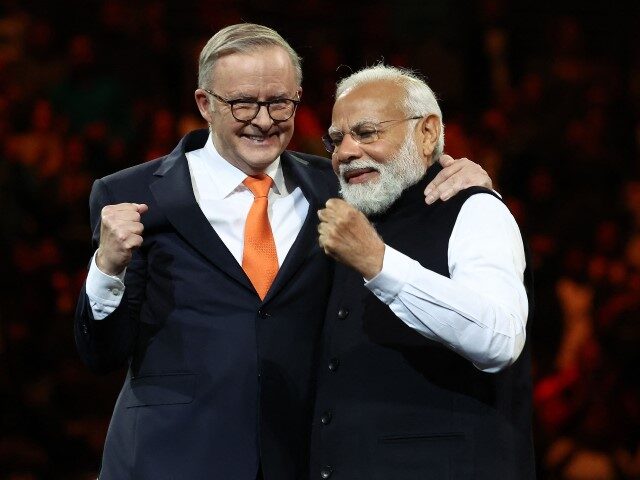Indian Prime Minister Narendra Modi presided over a raucous 20,000-person stadium event in Sydney, Australia, on Tuesday evening – a warm welcome to the Hindu nationalist leader in response to his decision to visit the country anyway after leftist American President Joe Biden canceled a planned stop there.
Biden and Modi, along with Japanese Prime Minister Kishida Fumio, had planned to meet with Australian Prime Minister Anthony Albanese in the latter’s country this week for talks under the Quadrilateral Security Dialogue, or Quad, an informal defense coalition largely meant to counter communist China’s growing belligerence in the South China Sea and greater Asia. The meeting would have followed the G7 Summit in Hiroshima, Japan, last weekend.
Biden showed up to Hiroshima, where he spent most of his time discussing the Russian invasion of Ukraine and meeting with Ukrainian President Volodymyr Zelensky, but canceled the next two scheduled stops on his Asia-Pacific tour, Papua New Guinea and Australia. As a result, Albanese canceled the Quad meeting in his country, and the four leaders held talks in Hiroshima.
“You can’t have a Quad leaders meeting when there are only three out of the four there,” a disappointed Albanese said.
The Chinese government has spent much of this week mocking Biden for canceling his stops in the region to go home and engage in debt ceiling negotiations with Congress. Chinese state media arms identified the Quad summit as an anti-China event and claimed its cancelation was proof that America is “a continuously declining power” that Pacific countries should not trust.
Arriving in Australia on Monday night, Modi made clear that combatting China’s threats to the region is a priority for both countries. In an interview with The Australian published upon his arrival, Modi emphasized that he sought to expand cooperation with Canberra in trade and especially in defense, citing “challenges” facing the Indo-Pacific region in a hint to concerns about communist China’s activities in the region.
“The Indo-Pacific faces a number of challenges such as climate change, natural disasters, terrorism, security of the sea lanes of communication, piracy, illegal fishing among others,” Modi told The Australian. “India believes that these challenges can be addressed only through shared efforts.”
“The high degree of mutual trust between us has naturally translated into greater co-operation on defence and security matters. Our navies are participating in joint naval exercises,” Modi continued. “I am confident that there is merit in working together to realise the true potential in closer defence and security co-operation.”
Modi asserted that the two countries align on their “strategic viewpoints,” particularly in the Indo-Pacific Ocean, which India and Australia border on either side.
The prime minister did not explicitly mention China, but the Chinese Communist Party’s activities in the region have become a paramount concern for both India and Australia.
The Chinese Communist Party illegally claims much of the South China Sea, despite an international court ruling declaring its claims illegitimate in 2016, and enforces its false claims through military exercises, illegal fishing, and maritime attacks on ships belonging to its neighbors. The Philippines and Vietnam, nations with far smaller navies than China, are most often the victims of these attacks.
China also insists on claiming much of India as its own in a similar fashion. In January, the Communist Party announced that it had renamed much of northeast India with Mandarin-language names; Beijing released a second set of new names for much of Arunachal Pradesh, India, in April. China also regularly invades Indian territory, most recently sending hundreds of People’s Liberation Army (PLA) soldiers across the border in December. The deadliest of these recent invasions occurred in the Galwan Valley – a territory in Ladakh, India – in 2020, resulting in Indian soldiers reportedly killing twice as many Chinese fighters and dozens dying of hypothermia or falling off cliffs.
At Sydney’s Qudos Bank Arena on Tuesday, Modi shelved much of his political material for an event celebrating the cultural ties between Australia and India. Albanese also attended, jokingly comparing Modi to one of the venue’s previous headliners, Bruce Springsteen.
“The last time I saw someone on this stage was Bruce Springsteen and he did not get the welcome that Prime Minister Modi has got. PM Modi is the Boss,” Albanese joked to cheers.
Modi used his remarks to celebrate the countries’ mutual love of cricket and the growing popularity of Indian cultural exports such as yoga in the country.
“Our lifestyles may be different but now Yoga also connects us. We have been connected due to cricket for long. But now tennis and films are also connecting us,” Modi said. “We might prepare food in different manners but Masterchef is connecting us now.”
Modi thanked Indians in Australia for helping endear the country to his hosts and made few political remarks, save for an apparent dig at Biden’s economy at home: “Banking systems in several countries are in trouble today but on the other hand, the strength of India’s banks are being appreciated everywhere.”
Modi will be in Australia through Wednesday and is expected to hold more substantive political talks with Albanese on Wednesday. In June, Modi is expected at the White House, where Biden will honor him with a formal State Dinner.
“I should take your autograph. You are causing me a real problem,” Biden reportedly told Modi during the G7 Summit. “Next month we have a dinner for you in Washington. Everyone in the whole country wants to come. I have run out of tickets … You are too popular.”

COMMENTS
Please let us know if you're having issues with commenting.